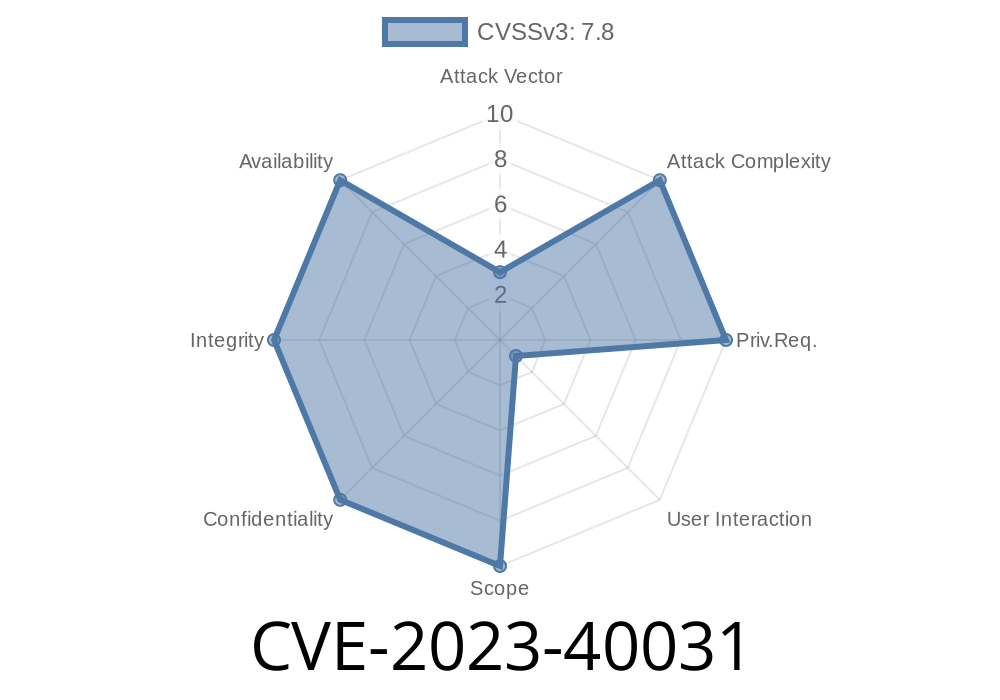Notepad++ is a popular free and open-source text editor, widely used by programmers and regular users alike. However, versions up to 8.5.6 include a critical vulnerability that can allow attackers to execute malicious code on your computer. This post aims to explain in clear, simple language how CVE-2023-40031 works, provide code snippets and details, and offer guidance on how to protect yourself while this vulnerability remains unpatched.
What is CVE-2023-40031?
CVE-2023-40031 is a heap buffer write overflow vulnerability found in Notepad++ (version 8.5.6 and prior), specifically in the Utf8_16_Read::convert function. An attacker can exploit this issue by tricking the user into opening a crafted file or payload, which results in overwriting important parts of the application's memory. This can ultimately allow an attacker to run their own code with the privileges of the target user.
Where Is The Problem?
The vulnerability lies in the Notepad++ codebase, specifically inside the convert method of the Utf8_16_Read class, responsible for converting UTF-8 data to UTF-16 format. If this function overruns the allocated buffer, it can overwrite application data or control structures, which is a classic recipe for arbitrary code execution.
Vulnerable Code Snippet
While the original codebase is large, the dangerous part looks like this (excerpted for clarity, not exact code):
int Utf8_16_Read::convert(char* src, wchar_t* dst, int srcLen) {
int dstIdx = ;
for(int srcIdx = ; srcIdx < srcLen; ++srcIdx) {
// ...conversion logic...
dst[dstIdx++] = (wchar_t)some_val; // <-- No check on dst capacity!
}
return dstIdx;
}
Here, dst is the destination buffer for the converted text, and dstIdx is used to track where to write the next value. However, if the conversion produces more output than the buffer can hold (especially for certain malformed UTF-8 files), it writes beyond the end of dst.
How Attackers Exploit This Vulnerability
Attackers can craft a file in a specific encoding or structure designed to trigger the overflow. By carefully manipulating the data, they can overwrite crucial function pointers or application data, redirecting execution flow to malicious code embedded in memory.
Below is a simple demo (Python-style pseudo-code) showing how a malicious file might be constructed
# This simplistic example doesn't cover full exploitation,
# but demonstrates the creation of an overlong sequence.
with open("evil.txt", "wb") as f:
# Malicious long sequence that triggers overflow on conversion
f.write(b"\xF" * 100) # Overlong 4-byte sequences, malformed UTF-8
When Notepad++ (v8.5.6 or prior) opens this file, Utf8_16_Read::convert tries to transform all input data, overruns its buffer, and unintentionally writes to memory it shouldn't.
Prepare Malicious File: The attacker creates a specially crafted text file.
2. Delivery: The file is delivered via email, instant message, or website, enticing the victim to open it with Notepad++.
3. Trigger Overflow: When Notepad++ opens the file, the flawed conversion function is called, overrunning the heap buffer.
4. Arbitrary Code Execution: The overwritten data may include function pointers or return addresses, leading to the attacker's code running on the victim system.
Severity and Risk
The National Vulnerability Database (NVD) gives this issue a high-severity rating. It impacts all users of Notepad++ up to and including version 8.5.6. No authentication or user interaction is needed besides opening a file.
As of this writing, there is no patch. If you use Notepad++ to handle files from unknown or untrusted sources, you are especially at risk.
Mitigations and What Can You Do?
- Avoid Opening Untrusted Files: Do not open text files from emails, instant messages, or websites unless you absolutely trust the source.
Disable File Preview (if possible): Avoid features that automatically parse or preview files.
- Monitor for Patch: Keep an eye on the official Notepad++ website and its GitHub repo for news about a fixed version.
- Alternate Editor: Use an alternative, up-to-date text editor until this vulnerability is patched.
Official References
- NVD entry for CVE-2023-40031
- Notepad++ GitHub Issues
- Notepad++ Download Page
Conclusion
CVE-2023-40031 is a serious threat that highlights the dangers of handling file formats and encodings without proper bounds checking. Until a new release fixes this bug, users should be cautious when using Notepad++ and avoid opening files from anyone they do not completely trust.
Timeline
Published on: 08/25/2023 20:15:00 UTC
Last modified on: 08/31/2023 18:11:00 UTC
